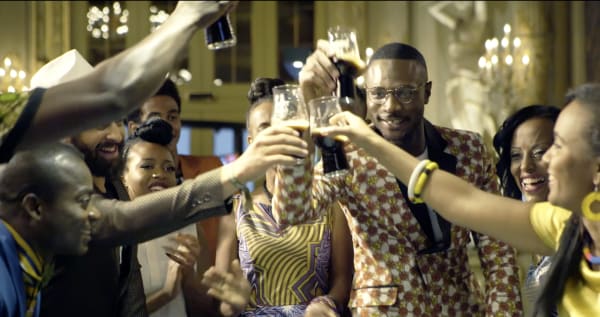-
The Nigerian-born, Berlin-based artist Emeka Ogboh draws on the evocative nature of auditory and gustatory stimuli to create sound and multimedia installations that prompt collective memories of place. Ogboh’s practice is rooted in synthesizing sounds found in his home country of Nigeria—such as the bustle of a Lagos bus station or the harmonized singing in an Igbo ámà (village square)—with institutions and sites of the Global North. While the artist uses sound as a unifying concept, Ogboh’s sonographic works complicate ideas of identity and belonging.
Notes on Exile is the first US gallery exhibition of work by Ogboh, and the US premiere of the artist’s internationally acclaimed work The Way Earthly Things Are Going (2017), which debuted at documenta 14.
-
-
The Way Earthly Things Are Going
-
Watch Video
The Way Earthly Things Are Going is an immersive soundscape that sets an LED strip of real-time market data from the stock indices against an ancient polyphonic Greek lamentation. With a title taken from Bob Marley’s well-known song “So Much Trouble in the World,” this multichannel sound installation examines the disconnect between Capitalism’s abstract market fluctuations and the concrete personal tragedies such peaks and valleys often induce. Though created with a focus on the Greek economic crisis for documenta 14 in Athens, the work offers a timeless interrogation of societal inequity.
-

-
-
Spirit and Matter
-
Spirit and Matter (2017-18) is a wall-mounted lightbox triptych with ambient sound. The imagery comprises a kaleidoscopic arrangement of mirrored photographs of Ojuelegba, the infamous central bus station in Lagos, a major artery of movement and migration in the busy city. Reminiscent of a cathedral’s stained-glass window, the simulacra of the bus driver, conductor, and bus come together to form a holy trinity of the sacred and profane.
-
-
Additional Available Works
-
Sufferhead Original is a conceptual craft beer project inspired by the experiences and food tastes of Africans living in Europe. The project allegorically utilizes the characteristics of beer and other beer-related notions to explore migration, race issues, and stereotypes about Africans in contemporary Europe.
The name "Sufferhead" was inspired by the 1981 track by Fela Kuti, ‘Original Suffer Head’, where Fela sings about the deplorable political and economic situation in Nigeria at that time.
Please inquire to view the videos.
-
-
Checklist
-
Emeka Ogboh (b. 1977, Enugu, Nigeria) received a B.A. in Fine & Applied Arts from the University of Nigeria, Nsukka in 2001. Recently, Ogboh’s Lost Person poster campaign was seen in Dresden’s public spaces, contributing to public pressure on the German government to begin repatriation of looted Benin Bronzes from German museum collections. Other recent projects include This Too Shall Pass, a major new commission for the EKHN Stiftung in Frankfurt, Germany; and Song of the Union, a new sound installation created for the Edinburgh Art Festival. Ámà: The Gathering Place is on view at Martin Gropius Bau in Berlin through January 2022
For inquiries about Emeka Ogboh, please contact Jane Cohan at jane@jamescohan.com .
-
¹ Bonaventure Soh Bejeng Ndikung, "Emeka Ogboh," documenta 14: Daybook, ed. Quinn Latimer and Adam Syzmczyk, published by Prestel, 2017.
Emeka Ogboh: Notes on Exile
Past viewing_room










